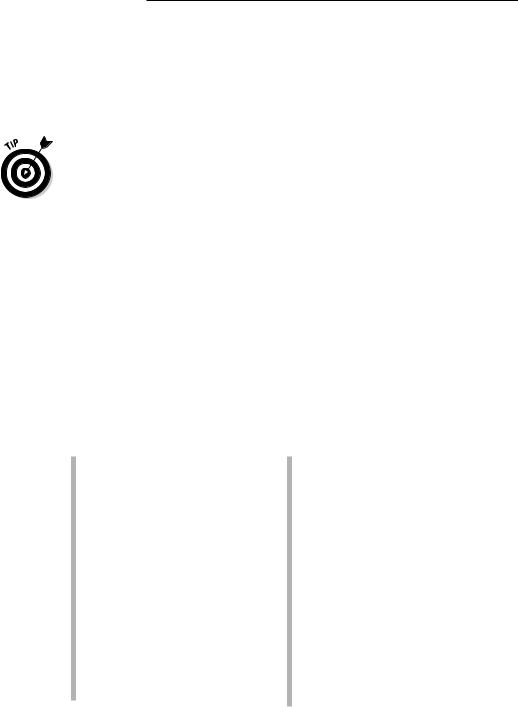
- •About the Authors
- •Dedication
- •Acknowledgments
- •Table of Contents
- •Introduction
- •About This Book
- •Conventions Used in This Book
- •Foolish Assumptions
- •How This Book Is Organized
- •Icons Used in This Book
- •Where to Go from Here
- •The French You’re Familiar With
- •Idioms and Popular Expressions
- •Key Parts of Speech
- •Cavorting with Verbs
- •Forming Sentences and Questions
- •The French Alphabet
- •Uttering Vowel and Consonant Sounds
- •Greetings: Formal and Friendly
- •Asking Questions to Get to Know People
- •Counting Your Lucky Stars: Numbers
- •Using the Calendar and Dates
- •Telling Time in French
- •Discussing Where You Live with the Verb “Habiter”
- •Discussing Daily Routine with Reflexive Verbs
- •Using Possessive Adjectives to Introduce Your Family Members
- •Basic Questions and Polite Expressions
- •Stating Your Preferences
- •Talking about Your Livelihood
- •Chatting about the Weather
- •Deciding to Keep in Touch
- •Getting Direction about Directions
- •Dining Out
- •Going to the Market
- •Going Shopping
- •Going Out with the Verb “Sortir”
- •Having Fun with the Verb “S’amuser”
- •Oh, the Places You’ll Go!
- •Making Plans with Friends
- •Making a Phone Call
- •Livin’ in the Past: Using the Past Tense
- •Playing Sports and Games
- •Going to the Beach
- •Setting Up Camp
- •Enjoying Quieter Pursuits
- •Where Do You Want to Go?
- •Getting Ready for Your Trip
- •Getting Current with Currency
- •Going to the Bank
- •Using Credit Cards and ATMs
- •Getting through the Airport
- •Navigating Buses, Trains, and Subways
- •Getting Around by Car
- •Finding Accommodations
- •Checking In to a Hotel
- •Checking Out of a Hotel
- •Getting Help Fast
- •Getting Medical Help
- •Handling Legal Matters
- •Label the Things in Your House
- •Write Your Shopping Lists in French
- •Listen to French Music
- •Watch French Movies
- •Tune in to TV5
- •Read French Publications
- •Take a Class
- •Join a French Association
- •Join an Online Chat or Pen Pal Forum
- •Using “Tu” When You Mean “Vous”
- •Using “Bonne nuit!” for Good-Bye
- •Using “Garçon” or “Porteur” to Address Service Staff
- •Saying “Je suis excité(e)” to Indicate Excitement
- •Saying “Je suis chaud(e)/froid(e)” to Say You’re Hot or Cold
- •Saying “Je suis plein/e” to Mean You’re Full
- •Using “de la glace” to Request Ice
- •Using “Je suis . . . ans” to Tell Your Age
- •Asking for Change with “J’ai besoin de change”
- •Using the Verb “Visiter” in Reference to People
- •“À mon avis”
- •“C’est pas vrai”
- •“Avec plaisir”
- •“C’est génial”
- •“À votre santé”
- •“À vos souhaits”
- •“Quelle horreur!”
- •“À bientôt”
- •“Passez-moi un coup de fil!”
- •“On y va!” or “Allons-y!”
- •“Je n’en sais rien”
- •“Je n’en reviens pas”
- •“Ça vaut la peine”
- •“C’est pas grave”
- •“N’importe”
- •“Tu cherches midi à 14h”
- •“Prenons un pot!”
- •Regular French Verbs
- •Auxiliary French Verbs
- •Track Listing
- •Customer Care
- •Index

Chapter 1
The French You Already Know
In This Chapter
French words that are identical or similar to their English counterparts
French words to watch out for
Idioms and popular expressions you may already know
Learning a new language can be challenging. Not only do you need to know a whole new vocabulary, but you also need to twist your
head around different grammar rules and your tongue around different pronunciation rules. But here’s a little news that may make the task seem a little less daunting: You already know quite a few French words and expressions. How? Because the English language, being the borrower that it is, contains many French words and expressions, and French has absorbed some English words, too.
In this chapter, you get to explore some French words and phrases without having to know pronunciation or grammar rules (that info comes in Chapters 2 and 3). Here, we include French words that are spelled the same and mean the same as their English counterparts, as well as words that are close in meaning and spelling. But because not every French word that resembles an English word shares its meaning, we also tell you what words to watch out for. In addition, we include some French expressions that you probably already know and understand. By the end of this chapter, you may discover that you actually know more French than you previously thought.
The French You’re Familiar With
With just a narrow stretch of water between them, the English and the French have historically been pretty close, even if they haven’t always been the friendly allies they are today. In fact, French was the language of the English court for a very long time — a fact that many people tend to forget. (The Normans who invaded England in 1066 with William the Conqueror were French, as were some of the most prominent people in English history).
www.ATIBOOK.ir

10 |
Part I: Getting Started |
What does this have to do with your learning French? Well today, about 35 percent of English vocabulary is of French origin. That being the case, you already know an impressive amount of French, whether you realize it or not. The only pitfall you have to watch out for is that sometimes the English words have a different meaning from their French counterparts, and they almost certainly have a different pronunciation.
French nouns are preceded by either definite or indefinite articles. The definite articles are le (masculine), la (feminine), l’ (an abbreviation of either le or la), and les (plural); these are the equivalent to the English word the. The indefinite articles are un (masculine), une (feminine), des (plural); these are all equivalent to the English words a, an, or some. As you learn French, knowing which articles go with what nouns helps you identify the noun’s gender; that’s why we include the articles with the nouns in the lists throughout this book. Because the abbreviated article l’ obscures the noun’s gender, we added the gender in parentheses. Finally, because the articles are not always used in English translations, we don’t include them in the translations of the word lists: l’université (f) (lew-nee-vehr-see-tey) (university) and le kiosque (luh kyohhsk) (kiosk), for example.
Friendly allies — bons alliés
Several French words are spelled the same and have the same meaning as their English counterparts. The only thing that may be different is the pronunciation (for more on pronunciation guidelines, head to Chapter 3). Take a look at these bons alliés (bohN-zah-lyey) (friendly allies):
l’art (m) (lahr)
brave (brahv)
le bureau (luh bew-roh)
le client (luh klee-yahN)
le concert (luh kohN-sehr)
la condition (lah kohN- dee-syohN)
content (kohN-tahN)
le courage (luh kooh-rahzh)
le cousin (luh kooh-zaN)
la culture (lah kewl-tewr)
différent (dee-fey-rahN)
excellent (ehk-seh-lahN)
le garage (luh gah-rahzh)
le guide (luh geed)
important (aN-pohr-tahN)
le journal (luh zhoohr-nahl)
la machine (lah mah-sheen)
le message (luh mey-sahzh)
le moment (luh moh-mahN)
la nation (lah nah-syohN)
la nièce (lah nyehs)
l’orange (f) (loh-rahNzh)
le parent (luh pah-rahN)
www.ATIBOOK.ir

Chapter 1: The French You Already Know 11
possible (poh-see-bluh)
principal (praN-see-pahl)
probable (proh-bah-bluh)
la question (lah kehs-tyohN)
la radio (lah rah-dyoh)
le restaurant (luh rehs-toh- rahN)
la rose (lah rohz)
rouge (roohzh)
la route (lah rooht)
la science (lah syahNs)
le secret (luh suh-kreh)
le service (luh sehr-vees)
le signal (luh see-nyahl)
le silence (luh see-lahNs)
la solitude (lah soh-lee-tewd)
le sport (luh spohr)
la station (lah stah-syohN)
la statue (lah stah-tew)
la suggestion (lah sewg-zheh- styohN)
la surprise (lah sewr-preez)
la table (lah tah-bluh)
le taxi (luh tah-ksee)
le tennis (luh tey-nees)
le train (luh traN)
urgent (ewr-zhahN)
violet (vyoh-leh)
le voyage (luh voh-yahzh)
le zoo (luh zooh)
Kissing cousins
Some French words, while not identical in spelling to their English counterparts, look very similar. These words also have similar meanings. Table 1-1 shows words that fit into this category.
Table 1-1 |
Words Similar in Meaning, Slightly |
|
|
|
Different in Spelling |
|
|
|
|
|
|
French |
English |
French |
English |
|
|
|
|
l’ acteur (m) (lahk-tuhr) |
actor |
l’ hôtel (m) (loh-tehl) |
hotel |
|
|
|
|
l’adresse (f) (lah-drehs) |
address |
le kiosque (luh kyohhsk) |
kiosk |
|
|
|
|
l’aéroport (m) (lah-eyr- |
airport |
la lampe (lah lahmp) |
lamp |
oh-pohr) |
|
|
|
l’allée (f) (lah-ley) |
alley |
la lettre (lah leh-truh) |
letter |
|
|
|
|
(continued)
www.ATIBOOK.ir

12 |
Part I: Getting Started |
Table 1-1 (continued)
French |
English |
French |
English |
l’Américain |
American |
la mémoire (lah mey- |
memory |
(m)/l’Américaine (f) |
|
mwahr) |
|
(lah-mey-ree-kaN/ |
|
|
|
lah-mey-ree-kehn) |
|
|
|
l’âge (m) (lahzh) |
age |
le miroir (luh mee- |
mirror |
|
|
rwahr) |
|
|
|
|
|
l’artiste (m/f) |
artist |
la musique (lah mew- |
music |
(lahr-teest) |
|
zeek) |
|
la banque (lah bahNk) |
bank |
la nationalité (lah nah- |
nationality |
|
|
syoh-nah-lee-tey) |
|
|
|
|
|
la cathédrale (lah kah- |
cathedral |
nécessaire (ney-sey- |
necessary |
tey-drahl) |
|
sehr) |
|
le chèque (luh shehk) |
check |
ordinaire (ohr-dee- |
ordinary |
|
|
nehr) |
|
|
|
|
|
la classe (lah klahs) |
class |
le papier (luh pah-pyey) |
paper |
|
|
|
|
la chambre (lah shahN- |
chamber, |
le poème (luh poh-ehm) |
poem |
bruh) |
bedroom |
|
|
la comédie (lah koh- |
comedy |
potentiel (poh-tahN- |
potential |
mey-dee) |
|
syehl) |
|
|
|
|
|
le congrès (luh kohN- |
congress |
le problème (luh proh- |
problem |
greh) |
|
blehm) |
|
la crème (lah krehm) |
cream |
le professeur (luh proh- |
teacher/ |
|
|
feh-suhr) |
professor |
la démocratie (lah dey- |
democracy |
le sénateur (luh sey- |
senator |
moh-krah-see) |
|
nah-tuhr) |
|
le développement (luh |
development |
le succès (luh sew- |
success |
dey-vlohp-mahN) |
|
kseh) |
|
|
|
|
|
la famille (lah fah- |
family |
la terrasse (lah teh- |
terrace |
meey) |
|
rahs) |
|
la géographie (lah zhey- |
geography |
la tragédie (lah trah- |
tragedy |
oh-grah-fee) |
|
zhey-dee) |
|
|
|
|
|
le gouvernement (luh |
government |
l’université (f) (lew-nee- |
university |
gooh-vehr-nuh-mahN) |
|
vehr-see-tey) |
|
l’histoire (f) (lee- |
history |
la visite (lah vee-zeet) |
visit |
stwahr) |
|
|
|
www.ATIBOOK.ir

Chapter 1: The French You Already Know 13
False friends — faux amis
Some French words are faux amis (foh-zah-mee) (false friends). They look similar to English words, but they don’t have the same meaning. Misusing these words can be quite confusing. For example, if you tell someone that your young adult son or daughter is in a collège (koh-lehzh), they’d probably look at you — or your child — strangely because the French word collège means middle school, not university. The following list shows some of these easy-to-confuse words:
actuellement (ahk-tew-ehl-mahN): This word means now, not actually. The French word for actually is en fait (ahN feht).
assister à (ah-sees-tey ah): This word means to attend, not to assist. The French word for to assist is aider (ey-dey).
attendre (ah-tahN-druh): This word means to wait for, not to attend. The French word for to attend is assister à (ah-sees-tey ah).
la bague (lah bahg): This word means ring (the kind you wear on your finger), not bag. The French word for bag is le sac (luh sahk).
blesser (bleh-sey): This word means to wound or to hurt. The French word for to bless is bénir (bey-neer).
la cave (lah kahv): The French word cave means cellar in French. The word for cave is la grotte (lah grohht) in French.
le collège (luh koh-lehzh) means middle school; use the French word l’université (f) (lew-nee-vehr-see-tey) when you want to say college.
formidable (fohr-mee-dah-bluh): This word means wonderful or tremendous, not fearsome or daunting. To say formidable in French, you use the word redoutable (ruh-dooh-tah-bluh).
la lecture (lah leh-ktewr): This word means a reading, as in a reading of Balzac’s novels. The word for lecture is la conférence (lah kohN-fey-rahNs).
la librairie (lah lee-brey-ree): This word means bookstore, not library. The French word for library is la bibliothèque (lah bee-blee-oh-tehk).
la place (lah plahs): This word means square, seat at the theater, or seat on the bus, not place. The French word for place is le lieu (luh lyuh) or l’endroit (m) (lahN-drwah).
rester (rehs-tey): This word means to stay or to remain, not to rest. The French word for to rest is se reposer (suh-ruh-poh-zey).
sympathique (saN-pah-teek): This word means nice. To say sympathetic in French, you say compatissant(e) (kohN-pah-tee-sahN[t]).
la veste (lah vehst): This word means jacket in French, not vest or waistcoat. The French word for vest is le gilet (luh zhee-leh).
www.ATIBOOK.ir

14 |
Part I: Getting Started |
Borrowed English words
The preceding sections note quite a few English words that have been borrowed from French and that have retained their French meaning, even though the pronunciation is different.
But English isn’t the only language that’s nicked a few words. French has also borrowed many words from English and continues to do so in spite of the loud protest by purists who condemn this trend as a sign of cultural contamination and name it franglais (frahN-gleh): Here is a list of some of the terms borrowed from English and absorbed into the French language. Note the different pronunciation:
le budget (luh bewd-zheh)
le business (luh beez-nehs)
le camping (luh kahN-peeng)
le chewing-gum (luh shweeng-gohhm)
les chips (ley sheep[s])
le coca (luh koh-kah)
cool (koohl)
le fast food (luh fahst foohd)
le hamburger (luh ahm- boohr-guhr)
le jet set (luh jeht seht)
le manager (luh mah-nah-jehr)
le marketing (luh mahr-kuh-teeng)
le parking (luh pahr-keen)
le rock (luh rohk) (as in rock music)
le shopping (luh shoh-peeng)
le steak (luh stehk)
le chat (luh chaht)
le tunnel (luh tew-nehl)
le week-end (luh wee-kehnd)
Talkin’ the Talk
Take a look at this conversation between two young French people making plans for their weekend. They’re using several words borrowed from English.
Thomas: Sylvie, qu’est-ce que tu fais ce week-end? seel-vee, kehs-kuh tew feh suh wee-kehnd?
Sylvie, what are you doing this weekend?
www.ATIBOOK.ir

Chapter 1: The French You Already Know 15
Sylvie: Oh, du shopping probablement. Tu veux venir avec moi?
oh, dew shoh-peeng proh-bah-bluh-mahN. tew vuh vuh-nee-rah-vehk mwah?
Oh, I’ll probably go shopping. Do you want to come with me?
Thomas: OK, cool, et après, on va aller manger dans un fast food.
oh-keh, kooh-ley-ah-preh, ohN vah ah-ley mahN-zhey dahN-zuhN fahst foohd.
OK, cool, and afterwards, we’ll go eat in a fast food place.
Sylvie: J’espère qu’on va trouver un parking! zhehs-pehr kohN vah trooh-vey uhN pahr-keeng! I hope we’ll be able to find a parking space!
Quebec is pure French
The rules of good and pure French speech are especially enforced in Quebec. People in Quebec will easily understand your franglais, but you may be taken aback when you hear Quebeckers talk about the following, where the French use the English word:
la fin de semaine (lah faN duh suh-mehn) (weekend)
un hambourgeois (uhN ahN-boohr-zhwah) (hamburger)
le magasinage (luh mah-gah-zee-nazh) (shopping)
la mise en marché (lah mee-zahN mahrshey) (marketing)
le stationnement (luh stah-syoh-nuh- mahN) (parking)
Quebec’s purism is easily explained:
The proximity of the United States south of its border, plus the English-speaking majority in Canada threatens the French cultural identity of Quebec’s 7.5 million inhabitants. For Quebeckers, their language constitutes a rampart against the all-powerful presence of the English — spoken by 300 million people — surrounding them.
People who lived mostly in rural isolation for 300 years are now living in modern cities like Montreal, Quebec, Sherbrooke, and a few others where cable TV is constantly bombarding them with American commercials, movies, and a variety of shows. These people are trying to preserve the French lanuage.
Although protective of their language, FrenchCanadians are an extremely friendly people who welcome their southern neighbors.
www.ATIBOOK.ir
